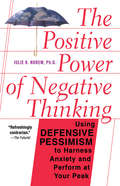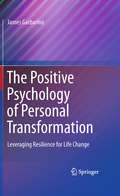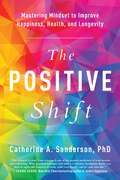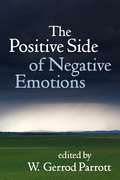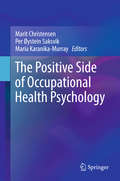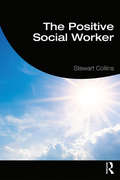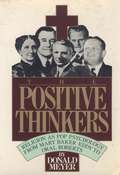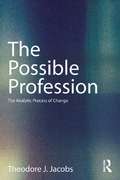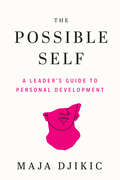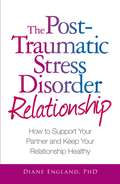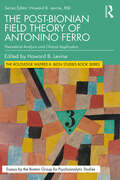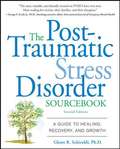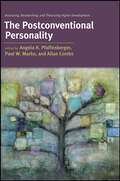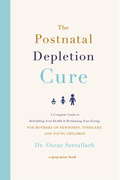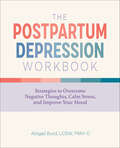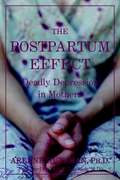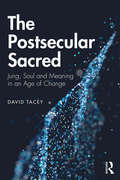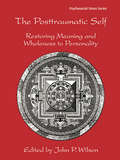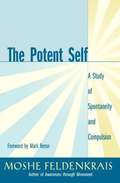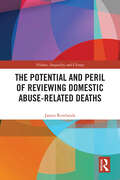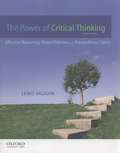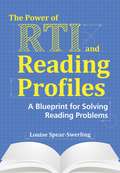- Table View
- List View
The Positive Power of Negative Thinking: Using Defensive Pessimism to Harness Anxiety and Perform at Your Peak
by Julie K. NoremHow often are we urged to "look on the bright side"? From Norman Vincent Peale to the ubiquitous smiley face, optimism has become an essential part of American society. In this long-overdue book, psychologist Julie Norem offers convincing evidence that, for many people, positive thinking is an ineffective strategy--and often an obstacle--for successfully coping with the anxieties and pressures of modern life. Drawing on her own research and many vivid case histories, Norem provides evidence of the powerful benefits of "defensive pessimism," which has helped millions to manage anxiety and perform their best work.
The Positive Psychology of Buddhism and Yoga: Paths to A Mature Happiness
by Marvin LevineThis book describes Buddhist-Yogic ideas in relation to those of contemporary Western psychology. The book begins with the Buddhist view of the human psyche and of the human condition. This leads to the question of what psychological changes need to be made to improve that condition. Similarities between Buddhism and Western Psychology include: Both are concerned with alleviating inner pain, turmoil, affliction and suffering. Both are humanistic and naturalistic in that they focus on the human condition and interpret it in natural terms. Both view the human being as caught in a causal framework, in a matrix of forces such as cravings or drives which are produced by both our biology and our beliefs. Both teach the appropriatenss of compassion, concern and unconditional positive regard towards others. Both share the ideal of maturing or growth. In the East and the West, this is interpreted as greater self possession, diminished cravings and agitations, less impulsivity and deeper observations which permit us to monitor and change our thoughts and emotional states. Buddhism, Yoga, and Western Psychology, especially the recent emphasis on positive psychology, are concerned with the attainment of deep and lasting happiness. The thesis of all three is that self-transformation is the surest path to this happiness.
The Positive Psychology of Personal Transformation
by James GarbarinoThis book reveals the social basis for moral development in adversity, and the mental and physical benefits of psychological and spiritual growth. Drawing widely on the author's experiences, the book has vast significance across the healing disciplines.
The Positive Shift: Mastering Mindset to Improve Happiness, Health, and Longevity
by Catherine A. SandersonIt's the reason why spending time on Facebook makes us feel sad and lonely. Why expensive name-brand medicines provide better pain relief than the generic stuff, even if they share the same ingredients. And why a hospital room with a good view speeds up recovery from surgery. The truth is, the way we think about ourselves and the world around us dramatically impacts our happiness, health, how fast or slow we age, and even how long we live. In fact, people with a positive mindset about aging live on average 7.5 years longer than those without. That might sound alarming to those of us who struggle to see the bright side, but the good news is we can make surprisingly simple changes or small shifts to how we think, feel, and act that will really pay off. In The Positive Shift: Mastering Mindset to Improve Happiness, Health, and Longevity, Dr. Catherine Sanderson breaks down the science of thought and shows how our mindset—or thought pattern—exerts a substantial influence on our psychological and physical health. Most important, this book demonstrates how, no matter what our natural tendency, with practice we can make minor tweaks in our mindset that will improve the quality—and longevity—of our life. Combining cutting-edge research from the fields of psychology, neuroscience, and medicine, as well as vivid real-world examples of the power of mindset, The Positive Shift gives readers practical and easy strategies for changing maladaptive thought patterns and behaviors so they can live longer, happier lives. These behaviors include: Appreciating nature, with actions as simple as eating lunch outside Giving to others, like volunteering Spending money on experiences, not possessions Living your best life is truly mind over matter. Believe in yourself and rethink your way to a happier reality.
The Positive Side of Negative Emotions
by W. Gerrod ParrottThis unique volume brings together state-of-the-art research showing the value of emotions that many believe to be undesirable. Leading investigators explore the functions and benefits of sadness, anxiety, anger, embarrassment, shame, guilt, jealousy, and envy. The role of these emotions in social interactions and relationships is examined, as are cultural differences in how they are valued and expressed. The volume considers how people seek out these feelings in everyday life to improve performance, gain insight, and express cares and commitments. Negative emotions are shown to have an important place in a rich and meaningful life.
The Positive Side of Occupational Health Psychology
by Maria Karanika-Murray Marit Christensen Per Øystein SaksvikThis book serves as an introduction to the Nordic approach to Occupational Health Psychology and illustrates how this perspective can be transferred to a global audience. It discusses a joining of attitudes from Positive Psychology accompanied by experiences drawn from the Nordic work/life context. Over the decades, Nordic countries have gathered a great deal of experience on the meaningfulness of work, work engagement, presenteeism, absenteeism, job crafting, work family balance, intervention and reorganization. These experiences are explained and offered as a different approach to Occupational Health Psychology, while avoiding the more traditional detrimental topics such as stress, conflict burnout and poor well-being. Instead the authors discuss subjects such as engagement, healthy change, prosperity and welfare and are applied to the current ideas on Occupational Health Science. This book shows that using interdisciplinary observations can help our understanding of modern worker health. It offers gives readers an opportunity to consider how a combination of good work and good health can be stimulated in theory and in practice.
The Positive Social Worker
by Stewart CollinsDeveloped from the author’s own experiences in social work and social work education, this book considers alternative approaches for social workers in dealing with the extensive demands, persistent pressures, and stress that they may face in their daily working lives. The Positive Social Worker is firmly located in an individual, group, organisational, cultural, and socio-political context. It considers and celebrates concepts linked to the importance, and sources, of work-related well-being. Individual chapters describe and critically analyse the social work context, the role of hope, optimism, commitment, resilience, support, appraisals, positive emotions, and coping, self-efficacy, control, and agency. Throughout, clear links are made with social work practice. While the book concentrates on a UK context, it draws on literature from social work, social, organisational, work, and positive psychology and sociology, from the UK, the USA, Europe, Australasia, and other countries. This book should be considered essential reading for social workers, graduate and postgraduate social work students, practice teachers, and lecturers. It will also be of relevance to professionals and professionals-in-training in the criminal justice and health and social care fields.
The Positive Thinkers
by Donald MeyerThe subject of Professor Meyer's superb study concerns the dissolution of the Protestant ethic, its relationship to a general failure of nerve within the American community, and the consequent rise of a pseudo-theology in the guise of a pseudo-psychology, as reflected through the work of certain "mind-cure" practitioners, from Mary Baker Eddy to Norman Vincent Peale. It is a subject largely ignored by intellectuals, and Professor Meyer, in taking it out of the domain of the Reader's Digestor similar habitations, has produced a real service, not only to sociology and political science, disciplines in which he is very well versed, but also to mass-culture and the vague but insidious ethos behind it. In describing what the sub-title states as "the American Quest for Health, Wealth, and Personal Power," Professor Meyer works from an historical perspective, does not beat any drums nor ride any hobby horse; scholarly care and an in-depth generosity illuminate a number of intricate concepts, whether they be "individualism," laissez-faire industry or the peculiar role and influence of women within society. His work is schematized yet fluid, showing how a process of ego-disintegration has paradoxically resulted out of the improperly understood religious orientation of the past and the anxiety-ridden religious revival of the present. Today God "means" Adjustment.--Virgina Kirkus, Kirkus Reviews
The Possible Profession: The Analytic Process Of Change
by Theodore J. JacobsThe Possible Profession: The Analytic Process of Change takes a fresh look at the many forms of unconscious communication that take place in the analytic situation. Bringing together two decades of the author’s previous writing as well as a considerable amount of new material, this book addresses a major contemporary issue in the field of psychoanalysis. Unconscious communication in the analytic situation takes many forms. This book explores a number of these pathways as the author has encountered them in clinical work. Including numerous clinical examples, chapters cover a variety of topics with a central focus on: the relationship between the inner worlds of patient and analyst the interplay between these intrapsychic forces how this interaction affects the analytic process and, more specifically, the therapeutic action of psychoanalysis. Written in a clear and concise way this book contributes to a new understanding of familiar material in a way that will be welcomed by teachers, students, and practitioners of psychoanalysis and psychotherapy. It will also be of interest to dynamic therapists of all persuasions and academics in various fields interested in psychoanalytic thinking.
The Possible Self: A Leader's Guide to Personal Development
by Maja DjikicAwarded the Gold IBPA Book Award in the Psychology category. Sometimes success isn't enough—discover how to achieve lasting, whole-life fulfillment through a simple five-stage plan that corresponds with the five key parts of ourselves.We're often told that the key to success in life involves advancing in our careers, so why do feel stuck and unfulfilled when everything seems to be going right?Adult development expert Maja Djikic explains that in order to discover our purpose and achieve real, lasting change, we need to move beyond narrowly targeted ideas and strategies like changing our mindset or slightly altering one aspect of our behavior. Instead, we need to go deeper and focus on our innate desires.Djikic says that sustained change can only happen when our whole self moves holistically the same direction and at the same time. She introduces a transformational system called the Wheel of Change—a simple, five-segment plan that corresponds with the five key parts of ourselves: Desires, Actions, Emotions, Thoughts, and Body.By understanding the mechanisms of these five integral parts, you will be able to escape the paradox of success without happiness and move towards your own path of fulfilling self-development.
The Post Traumatic Stress Disorder Relationship: How to Support Your Partner and Keep Your Relationship Healthy
by Diane EnglandWar, physical and sexual abuse, and natural disasters. All crises have one thing in common: Victims often suffer from post-traumatic stress disorder (PTSD) and their loved ones suffer right along with them. In this book, couples will learn how to have a healthy relationship, in spite of a stressful and debilitating disorder. They'll learn how to: —Deal with emotions regarding their partner's PTSD —Talk about the traumatic event(s) —Communicate about the effects of PTSD to their children —Handle sexual relations when a PTSD partner has suffered a traumatic sexual event —Help their partner cope with everyday life issues When someone has gone through a traumatic event in his or her life, he or she needs a partner more than ever. This is the complete guide to keeping the relationship strong and helping both partners recover in happy, healthy ways.
The Post-Bionian Field Theory of Antonino Ferro: Theoretical Analysis and Clinical Application (The Routledge Wilfred R. Bion Studies Book Series)
by Howard B. LevineThis exciting and original collection explores Antonino Ferro’s post-Bionian Field Theory, expanding upon the analytic work of Wilfred Bion to focus on the intersubjective development of psychic regulatory processes. Written by members of the Boston Group for Psychoanalytic Studies who have maintained a close and fruitful collaboration with Ferro and his colleagues, the book centers on understanding, engaging and treating primitive mental states. Ferro's Field Theory operationalizes Bion’s concept of an analyst who is not the repository of ‘the truth’, but is instead one who has the capacity to listen, to dwell in doubt, to utilize reverie, humor and play, and facilitate the transformation of previously unthinkable aspects of the patient’s experience into articulatable mental elements such as pictorial images, thoughts and dreams. Ferro’s contributions and their analysis are especially relevant to working with primitive character disorders, the difficulties of which lie beyond neurosis and the comfortable reach of the precepts of classical analytic technique. Each chapter features detailed clinical examples that explicate and apply post-Bionian Field Theory, making this book an interesting and useful read for analysts and analytic therapists of all orientations, who work with patients in all diagnostic categories.
The Post-Traumatic Stress Disorder Sourcebook
by Glenn R. SchiraldiTrauma can take many forms, from witnessing a violent crime or surviving a natural disaster to living with the effects of abuse, rape, combat, or alcoholism. Deep emotional wounds may seem like they will never heal. However, with The Post-Traumatic Stress Disorder Sourcebook, Dr. Glenn Schiraldi offers a remarkable range of treatment alternatives and self-management techniques, showing survivors that the other side of pain is recovery and growth. Live your life more fully-without fear, pain, depression, or self-doubt Identify emotional triggers-and protect yourself from further harm Understand the link between PTSD and addiction-and how to break it Find the best treatments and techniques that are right for you This updated edition covers new information for war veterans and survivors with substance addictions. It also explores mindfulness-based treatments, couples strategies, medical aids, and other important treatment innovations.
The Postconventional Personality: Assessing, Researching, and Theorizing Higher Development (SUNY series in Transpersonal and Humanistic Psychology)
by Allan Combs Angela H. Pfaffenberger Paul W. MarkoPostconventional stages of personality development involve growth well beyond the average, and have become a rapidly growing subject of research not only in developmental psychology circles, but also in areas such as executive leadership development. The present work is the first to bring together many of the major researchers in the field, showcasing diverse perspectives ranging from the spiritual to the corporate. The contributors present research on essential questions about the existence and prevalence of high levels of personal growth, whether such achievement is correlated with other kind of psychological growth, whether high levels of growth actually indicate happiness, what kinds of people exhibit these higher levels of development, how they may have developed this expanded perspective, and the characteristics of their viewpoints, abilities, and preoccupations. For anyone interested in Ken Wilber's integral psychology as well as those in executive coaching, this volume is an invaluable resource and will be a standard reference for years to come.
The Postnatal Depletion Cure: A Complete Guide To Rebuilding Your Health And Reclaiming Your Energy For Mothers Of Newborns, Toddlers And Young Children
by Dr Oscar SerrallachIt's all too common to hear new mums talk about 'baby brain' and extreme fatigue. But what if it wasn't the physical toll of giving birth, breastfeeding or chasing a toddler that was sapping your strength? What it if was something deeper? Dr. Oscar Serallach has spent his medical career witnessing women fail hormonally, nutritionally and emotionally to get back on their feet after having a baby. The true cause? A syndrome he calls postnatal depletion. THE POSTNATAL DEPLETION CURE is the first book to name the syndrome and to offer a practical programme to help mothers replenish their bodies after having a baby. The book includes a comprehensive guide to the nutrients women need to enhance organ function and balance hormones, along with advice on how to maintain a healthy diet and exercise routine and get necessary rest, despite the demands of motherhood. Filled with prescriptive takeaways and many success stories, THE POSTNATAL DEPLETION CURE will help mothers be the best they can be physically and emotionally.
The Postpartum Depression Workbook: Strategies to Overcome Negative Thoughts, Calm Stress, and Improve Your Mood
by Abigail BurdPowerful strategies and compassionate support for overcoming postpartum depressionBecoming a parent is a huge transition. For some, the mood swings, the pressures, and the anxiety can be intense and overwhelming. One in five women will develop postpartum depression (PPD) after pregnancy—so if you're struggling with PPD, know you're not alone. This depression workbook is designed to help you navigate the transition to becoming the healthy and happy parent you want to be.This depression workbook is here to guide you on your journey, providing supportive strategies and tools grounded in cognitive behavioral therapy (CBT)—proven to help you understand, cope with, and reduce your PPD symptoms. Discover common signs of PPD, what it is, and what you can do about it. Explore your thoughts, feelings, and relationships, plus self-care practices through a variety of practical and insightful exercises in this depression workbook.This depression workbook includes:Primer on PPD—Discover if you might have PPD, take a look at common causes and risk factors, and see how PPD can impact your partner.Lasting relief—The CBT-based postpartum strategies in this depression workbook will help you adopt a positive mindset, improve your mood, deepen your relationships, and find time to recharge.Parents like you—Find kinship in real-life scenarios from other parents, paired with practical advice, simple tips, and interactive exercises.This depression workbook provides the strategies, tools, and support you'll need for a healthy and happy transition into parenthood.
The Postpartum Effect: Deadly Depression in Mothers
by Paul J. Goodnick Arlene M. HuysmanThe past decade has seen strides in the diagnosis and treatment of postpartum depression, which affects 400,000 women annually in the United States. Yet the most tragic of these cases--the filicides and suicides that spark tabloid frenzy--continue to be horribly misdiagnosed. Dr. Arlene Huysman, drawing on decades of clinical work, here describes the postpartum effect, the missing key to treatment.Dr. Huysman's book is designed to educate the general public, and to serve as a tool in the care provider's hands. In The Postpartum Effect the author records anonymous first-person testimonies from mothers who were tempted to harm their children. She constructs a profile of mothers at greatest risk of the disease. All leading up to the central question: What drives a mother to the ultimate travesty? Dr. Huysman's measured, empirical approach is a plea for understanding.
The Postsecular Sacred: Jung, Soul and Meaning in an Age of Change
by David TaceyIn The Postsecular Sacred: Jung, Soul and Meaning in an Age of Change, David Tacey presents a unique psychological study of the postsecular, adding a Jungian perspective to a debate shaped by sociology, philosophy and religious studies. In this interdisciplinary exploration, Tacey looks at the unexpected return of the sacred in Western societies, and how the sacred is changing our understanding of humanity and culture. Beginning with Jung’s belief that the psyche has never been secular, Tacey examines the new desire for spiritual experience and presents a logic of the unconscious to explain it. Tacey argues that what has fuelled the postsecular momentum is the awareness that something is missing, and the idea that this could be buried in the unconscious is dawning on sociologists and philosophers. While the instinct to connect to something greater is returning, Tacey shows that this need not imply that we are regressing to superstitions that science has rejected. The book explores indigenous spirituality in the context of the need to reanimate the world, not by going back to the past but by being inspired by it. There are chapters on ecopsychology and quantum physics, and, using Australia as a case study, the book also examines the resistance of secular societies to becoming postsecular. Approaching postsecularism through a Jungian perspective, Tacey argues that we should understand God in a manner that accords with the time, not go back to archaic, rejected images of divinity. The sacred is returning in an age of terrorism, and this is not without significance in terms of the ‘explosive’ impact of spirituality in our time. Innovative and relevant to the world we live in, this will be of great interest to academics and scholars of Jungian studies, anthropology, indigenous studies, philosophy, religious studies and sociology due to its transdisciplinary scope. It would also be a useful resource for analytical psychologists, Jungian analysts and psychotherapists.
The Posttraumatic Self: Restoring Meaning and Wholeness to Personality (Psychosocial Stress Series)
by John P. WilsonFilling a gap that exists in most traumatology literature, The Posttraumatic Self provides an optimistic analysis of the aftermath of a traumatic event. This work appreciates the potentially positive effects of trauma and links those effects to the discovery of one's identity, character, and purpose. Wilson and his distinguished contributors explore the nature and dynamics of the posttraumatic self, emphasising human resilience and prompting continued optimal functioning. While taking into consideration pathological consquences such as posttraumatic stress disorder (PTSD), the authors study the impacts a traumatic event can have on one's inner self, and they help the victims transform such an event into healthy self-transcendent lifecycles. The Posttraumatic Self will help victims and healers transform the way they deal with the complexities of trauma by making important connections that will allow for healing and growth.
The Potent Self: A Study of Spontaneity and Compulsion
by Moshe FeldenkraisAuthor is a scientist who pioneered the field of mind-body education and therapy. The book emphasizes emotional and neuromuscular linkages.
The Potential and Peril of Reviewing Domestic Abuse-Related Deaths (Violence, Inequality and Change)
by James RowlandsConsidering the potential and peril of Domestic Abuse-Related Death Reviews (DARDRs) in England and Wales as a way of learning from domestic abuserelated deaths, this book examines what DARDRs – first known as Domestic Homicide Reviews (DHRs) – are understood as being for, what is used by and in DARDRs, and how DARDRs are themselves used.Drawing on rich empirical data, this text combines information gathered from published DARDRs as well as from the experiences of stakeholders, including representatives from organisations who had contact with a victim, and those who knew them personally. This analysis is further underpinned by the author’s distinct perspective as a practitioner, which includes having led DARDRs as an independent chair. Setting out an approach that frames the review of domestic abuse-related deaths as a means of achieving justice, the book addresses best practice in making sense of domestic abuse-related deaths, the efforts to drive practice, policy and systems change, and the memorialisation of victims, with a view to improving responses to domestic abuse for all victims, survivors and, perhaps, to prevent future deaths.The Potential and Peril of Reviewing Domestic Abuse- Related Deaths will be of great interest to students and scholars of criminology, social work, and sociology, as a way of understanding the policy and practice of trying to make sense of and respond to domestic abuse-related deaths.
The Power Of Critical Thinking: Effective Reasoning About Ordinary And Extraordinary Claims
by Lewis VaughnThis comprehensive and engaging introduction to critical analysis delivers clear, step-by-step guidelines that provide students with the tools they need to systematically and rationally evaluate arguments, claims, and evidence. Fully up-to-date with examples from contemporary culture, politics, and media, this text helps students develop the skills they need to engage meaningfully with the world around them.
The Power Of Empathy: A Practical Guide To Creating Intimacy, Self-understanding And Lasting Love
by Katherine Ketcham Arthur P. CiaramicoliArguing that empathy is the driving force behind love, the author shows readers how to bring this all-important trait to the fore in relationships.
The Power Of Off: The Mindful Way To Stay Sane In A Virtual World
by Nancy ColierOur reliance on technology is rapidly changing how each of us experiences life. We’re facing new issues and difficulties, we’re encountering new emotional triggers, and we’re relating to each other in new ways. As Dr. Nancy Colier writes, "How we spend our time, what motivates us, and what we want are all are on a radical course of transformation." The promise of technology is that it will make our lives easier; yet to realize that promise, we cannot be passive users—we must bring awareness and mindfulness to our relationships with our devices. "The compulsion to constantly check our devices plays on primal instincts," teaches Colier. "Even people with strong spiritual practices or those who have never had other addiction issues now find themselves caught in the subtle trap of these miraculous tools we’ve created." Through The Power of Off, she offers us a path for making use of the virtual world while still feeling good, having healthy relationships, and staying connected with what is genuinely meaningful in life. You’ll explore: How and why today’s devices push our buttons so effectively, and what you can do to take back control of your life • Tips for navigating the increasingly complex ways in which technology is affecting our relationships—with ourselves, others, and our devices themselves • Self-evaluation tools for bringing greater awareness to your use of technology • Mindfulness practices for helping you interact with your devices in more conscious ways • A 30-day digital detox program to kick-start a new healthier relationship with technology With The Power of Off, Colier sounds the call for wakefulness, reminding us that we can use technology in a way that promotes, rather than detracts from, our well-being. This book provides an essential resource for anyone wanting to create a more empowered relationship with technology in the digital age.
The Power Of RTI And Reading Profiles: A Blueprint For Solving Reading Problems
by Louise Spear-SwerlingThis one-of-a-kind text explains why RTI is today's best approach for preventing reading difficulties—and how research on reading profiles can enhance the power of RTI. For practitioners, the book provides a complete, evidence-based blueprint for using RTI and reading profiles in tandem to plan effective core literacy instruction and help struggling readers in Grades K-6, whether they have disabilities or issues related to experience (e.g., ELLs, children from poverty backgrounds). For researchers and policymakers, the book describes ways to help ensure higher reading achievement for every student, including improvements in core reading instruction, use of RTI practices and the Common Core State Standards, and teacher preparation.
